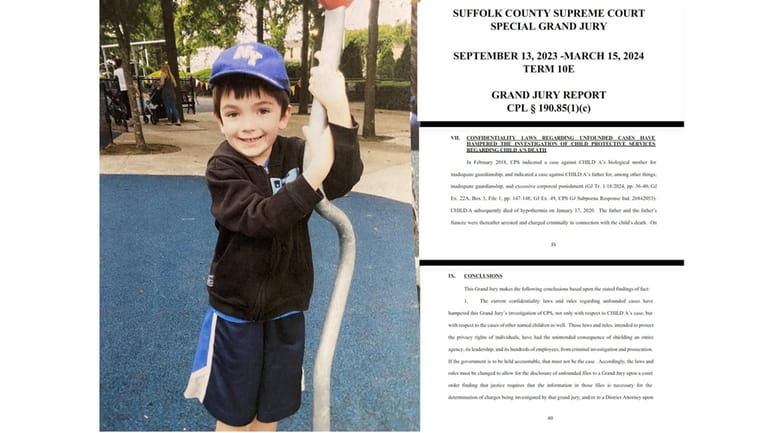Valva report shows law's flaws

Thomas Valva in an undated photo, and the title and pages from the grand jury report on the investigation into his death in January 2020. Credit: Courtesy Justyna Zubko-Valva
The innocent look on Thomas Valva’s face, in a photograph taken before his torturous death in January 2020, still haunts. We have yet to do right by this child if his memory is to remind us of the need to pay attention to those who cry for help.
The murderous parental caretakers of the eight-year-old boy with autism are in prison. Disturbing testimony at their trials raised larger questions as to why this case was terribly mishandled. A special grand jury report released Thursday describes, as best it could, how Suffolk County failed him.
In stunning detail, the comprehensive yet frustrating report shows how investigators from the Child Protective Services Investigations Bureau repeatedly marked as “unfounded” evidence from school officials and others, the very people mandated under law to report their concerns that Thomas was being abused. More so, it makes clear how current state Social Services Law effectively prevented the Suffolk district attorney from determining whether there was sufficient evidence to bring criminal charges against CPS workers or their superiors for their obvious dereliction of duty.
ABUSE DETAILED
The report details the abuse Thomas suffered. On an arctic January night, he died of hypothermia when forced to sleep on the frigid garage floor of his Center Moriches home along with his older brother, who survived. His father, Michael, an ex-New York City police officer, and Michael’s then-fiancee, Angela Pollina, are serving 25 years-to-life sentences.
The report describes how Thomas’ death was preventable, and how warning signs of abuse were repeatedly ignored or dismissed by CPS, an arm of the county Department of Social Services. This includes repeated calls to the agency by Thomas’ worried elementary school teachers. Thomas and his brother looked dirty, wore urine-soaked clothes, lost weight, and were so hungry they were spotted eating food out of the garbage, the educators told CPS. Yet, CPS seemed to give credence to what Valva’s father and Pollina told them. His father even accused elementary school staff of “harassing CPS” and his family while he increased the level of abuse against Thomas and his brother. Was Michael Valva given deference because of his status as a cop and his knowledge of how the system works?
The agency and its caseworkers, whose “child protective” mission is spelled out in its name, do not face criminal liability. The grand jury found that CPS workers were “effectively impervious” and “shielded” from criminal investigation because of existing state law that allowed the agency to take bureaucratic action after the boy died that would keep all “unfounded reports” concealed. As a result, files that would give Suffolk DA Ray Tierney and homicide detectives insight, if not evidence, about how CPS workers determined these reports were “unfounded” can’t be reviewed. As the grand jury wondered, could accounts of agency visits to the Valva home have been fabricated? Tierney doggedly went to State Supreme Court to get the files released but was rebuffed by a ruling that said state law protecting these files was ironclad.
LAW MUST BE CHANGED
This incredible scenario “hampered” its investigation, the grand jury said, and underlined the need for the State Legislature to change existing laws and confidentiality rules so that prior “unfounded reports” can be evaluated in criminal probes. The grand jury said the law was “shielding CPS and its employees from investigation into criminal culpability.”
Long Island’s state legislators must get this law changed before the end of this session.
Other steps must be taken. In July 2020, Suffolk’s legislature passed a new CPS law to improve oversight functions and provide new safeguards to protect children like Thomas. But the grand jury report sensibly recommends further reforms. Some are practical “best practices” like moving child welfare investigators into the same building with related agencies to foster better communication and oversight, improving its “hotline” service that responds to child abuse complaints, and perhaps creating its own training academy to provide better expertise and quality assurance. Other recommendations are more administrative, like making sure that yearly evaluations of CPS employees, which have not been occurring, now take place as required by existing county guidelines.
In response to the report, County Executive Ed Romaine blamed the prior CPS administration under Democrat Steve Bellone for failing to take actions “that could have saved a child’s life.” While that may indeed be so, Romaine needs to follow through on his vow to reform CPS. Suffolk needs to make sure the caseload handled by its underpaid and often beleaguered agency’s staff is not overwhelming — CPS referred 969 child abuse reports to the DA last year, some involving multiple kids and multiple offenders in the same incident. New York State needs to determine whether its oversight of the county failed as well.
But more was amiss in the Valva case. Citing the 10 “unfounded” findings, the grand jury report suggests CPS officials “deliberately” hid their culpability and the fatal errors in play. As a result, the full truth of how Thomas Valva died will never be revealed until current law is modified — not only for future cases but also for those past, via a “look back” provision to allow those “unfounded” reports in the Valva case to be reviewed.
The grand jury report is one window into this shamefully ill-performing agency. The moral imperative now is to make sure Suffolk has a child protection agency that actually protects children.
MEMBERS OF THE EDITORIAL BOARD are experienced journalists who offer reasoned opinions, based on facts, to encourage informed debate about the issues facing our community.
